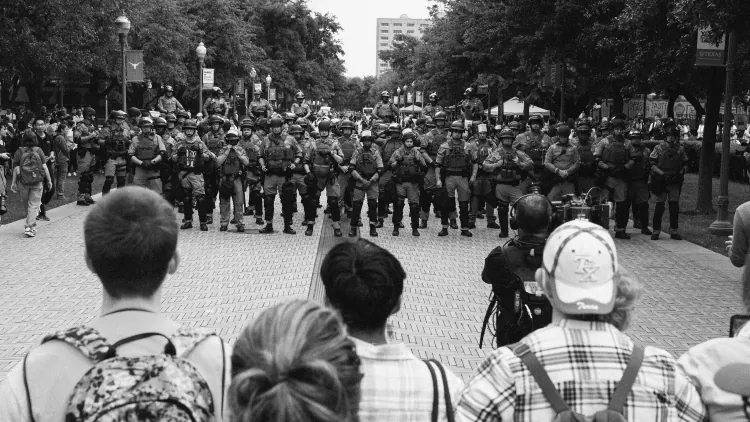Colleges Are Failing the Free Speech Test
Too many leaders are failing to uphold the First Amendment rights they claim to champion.

Say you’re a college senior, just a few weeks from graduation. For as long as you can remember—even back in high school, before you set foot on campus—older people have talked about free speech. More specifically, older people have talked about free speech and you: whether your generation understands it, whether you believe in it, whether you can handle it.
After watching some of those same people order crackdowns on campus protests over the past few days, you might have a few questions for them.
Last week, from New York to Texas, cops stormed college campuses clad in riot gear. They weren’t there to confront active shooters, thank goodness, or answer bomb threats. Instead, they were there to conduct mass arrests of students protesting the war in Gaza.
As the legal director of a First Amendment advocacy nonprofit, I teach students across the country that the government can’t silence speakers because of their beliefs, even—and perhaps especially—if those beliefs are unpopular or cause offense. That’s a foundational principle of free-speech law. But many of the crackdowns appear to be a direct reaction to the protesters’ views about Israel.
After sending a phalanx of state law-enforcement officers into the University of Texas at Austin campus, for example, Governor Greg Abbott announced on X that students “joining in hate-filled, antisemitic protests at any public college or university in Texas should be expelled.”
But no First Amendment exception exists for “hate-filled” speech. And for good reason: In our pluralistic democracy, everyone has their own subjective idea of what, if any, speech is too “hateful” to hear, making an objective definition impossible. And empowering the government to draw that line will inevitably silence dissent.
At UT, the officers arrested scores of protesters for “trespassing.” But the students don’t appear to have violated school rules. And you can’t trespass on a place where you have the right to be, as students at the public universities they attend clearly do. Even a cameraman for a local news station was tackled and arrested. The next day, the Travis County attorney’s office dropped all of the trespassing charges for lack of probable cause—a telling indicator of the disturbingly authoritarian response. (Shockingly, the cameraman does face a felony charge, for allegedly assaulting a police officer—an allegation difficult to square with video of his arrest.) The government can’t throw Americans in jail for exercising their First Amendment right to peaceful protest.
Governor Abbott’s illiberal show of force has no place in a free country. It’s especially galling given the governor’s previous posture as a stalwart defender of campus free speech: In June 2019, he signed a law prohibiting Texas’s public colleges and universities from shutting down campus speakers because of their ideology. So much for that.
Governor Abbott isn’t alone. During her congressional testimony earlier this month, Columbia University President Minouche Shafik pledged investigations of students and faculty who voiced allegedly anti-Semitic criticism of Israel and Zionism, and agreed—on the fly—to remove a professor from his position as a committee chair because of his speech.
Columbia is a private institution, so it isn’t bound by the First Amendment. But the university promises freedom of expression to its students and faculty—and Shafik’s willingness to sacrifice faculty and student rights to appease hostile members of Congress betrays those promises.
If such things had happened only at UT and Columbia, that would be bad enough—but the problem is spreading. At Emory University, in Atlanta, police officers reportedly used tear gas and Tasers against protesters. State troopers with rifles directed toward protesters stood watch on a rooftop at Ohio State University. At Indiana University, administrators rushed out a last-minute, overnight policy change to justify a similar show of force from law enforcement, resulting in 34 arrests. It’s hard to keep up.
Students nationwide are watching how the adults who professed to care about free speech are responding under pressure. And they are learning that those adults don’t really mean what they say about the First Amendment. That’s a dangerous lesson. Our schools and universities could still teach the country a better one.
“Free Speech 101” starts here: The First Amendment protects an enormous amount of speech, including speech that some, many, perhaps most Americans would find deeply offensive. You may not like pro-Palestine speech; you may not like pro-Israel speech. You may think some of it veers into bigotry. The answer is to ignore it, mock it, debate it, even counterprotest it. But don’t call in the SWAT team.
Granted, free speech is not without carefully designated exceptions, and these exceptions are important but narrow. True threats and intimidation, properly defined, are not protected by the First Amendment. Neither is discriminatory harassment. Violence is never protected.
And public universities can maintain reasonable “time, place, and manner” restrictions on speech. That means, for example, that for the authorities to place a ban on playing heavily amplified sound right outside the dorms at 2 a.m. likely does not violate the First Amendment. A prohibition on camping overnight in the quad probably doesn’t either.
But the enforcement of these rules must be evenhanded and proportionate. The use of force should be a last resort. Students must be given clear notice about what conduct crosses a line. And any student facing punishment for an alleged infringement should receive a fair hearing. Consistency counts. Our leaders—in government, in university administration—must demonstrate their commitment to free expression in both word and deed.
Students are protesting on campuses nationwide, and they’re watching the reaction of university presidents and elected officials closely. The current moment presents a generational challenge: Do older people and people in authority really mean what they say about the First Amendment? Do they believe in free speech—and can they handle it? Right now, too many leaders are failing the test.
What's Your Reaction?




















